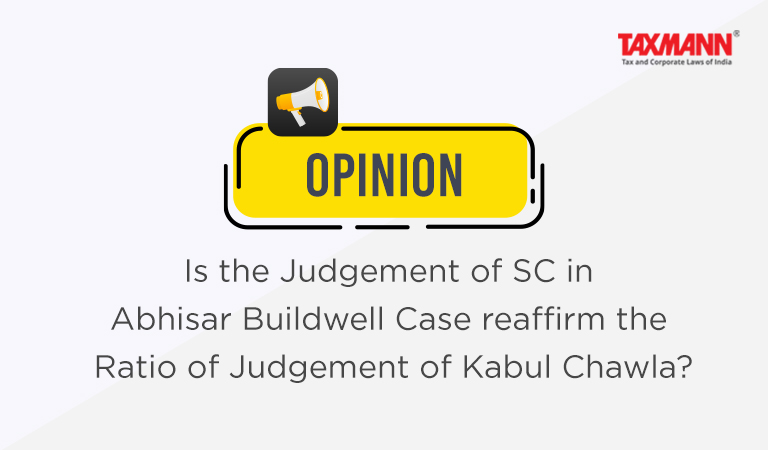[Opinion] Is the Judgement of SC in Abhisar Buildwell Case reaffirm the Ratio of Judgement of Kabul Chawla?
- Blog|News|Income Tax|
- 3 Min Read
- By Taxmann
- |
- Last Updated on 2 May, 2023

I. Introduction
Shorn of unnecessary details, coming straight to the point, it is pertinent to mention that the Hon’ble Supreme Court has passed another important judgement in the case of Pr. CIT v. Abhisar Buildwell (P.) Ltd. [2023] 149 taxmann.com 399. In our humble opinion, the said judgement is easy to read but hard to implement. For this precise reason, it appears that seeking some clarification a Miscellaneous Application (MA) is being filed in the Supreme Court by the Revenue. The outcome of which is yet to be decided. Be that as it may, the present article is an attempt to throw some light on the interpretation and fall out of the said judgement. We are sure that the same will tinker the brain.
II. Ratio of Kabul Chawla
Before moving further, it is relevant to recapitulate and reproduce the exact finding made by the Hon’ble Delhi High Court in one of the most celebrated judgment in the case of “CIT v. Kabul Chawla [2015] 61 taxmann.com 412 (Delhi)/234 Taxman 300″. The concluding remarks of the Hon’ble Delhi High Court in the said case is as under:
Quote:
37. On a conspectus of section 153A(1) of the Act, read with the provisos thereto, and in the light of the law explained in the aforementioned decisions, the legal position that emerges is as under:
i. Once a search takes place under section 132 of the Act, notice under section 153 A(1) will have to be mandatorily issued to the person searched requiring him to file returns for six AYs immediately preceding the previous year relevant to the AY in which the search takes place.
ii. Assessments and reassessments pending on the date of the search shall abate. The total income for such AYs will have to be computed by the AOs as a fresh exercise.
iii. The AO will exercise normal assessment powers in respect of the six years previous to the relevant AY in which the search takes place. The AO has the power to assess and reassess the ‘total income’ of the aforementioned six years in separate assessment orders for each of the six years. In other words there will be only one assessment order in respect of each of the six AYs “in which both the disclosed and the undisclosed income would be brought to tax”.
iv. Although section 153 A does not say that additions should be strictly made on the basis of evidence found in the course of the search, or other post-search material or information available with the AO which can be related to the evidence found, it does not mean that the assessment
“can be arbitrary or made without any relevance or nexus with the seized material. Obviously an assessment has to be made under this Section only on the basis of seized material.”
v. In absence of any incriminating material, the completed assessment can be reiterated and the abated assessment or reassessment can be made. The word ‘assess’ in Section 153 A is relatable to abated proceedings (i.e. those pending on the date of search) and the word ‘reassess’ to completed assessment proceedings.
vi. Insofar as pending assessments are concerned, the jurisdiction to make the original assessment and the assessment under section 153A merges into one. Only one assessment shall be made separately for each AY on the basis of the findings of the search and any other material existing or brought on the record of the AO.
vii. Completed assessments can be interfered with by the AO while making the assessment under section 153 A only on the basis of some incriminating material unearthed during the course of search or requisition of documents or undisclosed income or property discovered in the course of search which were not produced or not already disclosed or made known in the course of original assessment.
Click Here To Read The Full Article
Disclaimer: The content/information published on the website is only for general information of the user and shall not be construed as legal advice. While the Taxmann has exercised reasonable efforts to ensure the veracity of information/content published, Taxmann shall be under no liability in any manner whatsoever for incorrect information, if any.

Taxmann Publications has a dedicated in-house Research & Editorial Team. This team consists of a team of Chartered Accountants, Company Secretaries, and Lawyers. This team works under the guidance and supervision of editor-in-chief Mr Rakesh Bhargava.
The Research and Editorial Team is responsible for developing reliable and accurate content for the readers. The team follows the six-sigma approach to achieve the benchmark of zero error in its publications and research platforms. The team ensures that the following publication guidelines are thoroughly followed while developing the content:
- The statutory material is obtained only from the authorized and reliable sources
- All the latest developments in the judicial and legislative fields are covered
- Prepare the analytical write-ups on current, controversial, and important issues to help the readers to understand the concept and its implications
- Every content published by Taxmann is complete, accurate and lucid
- All evidence-based statements are supported with proper reference to Section, Circular No., Notification No. or citations
- The golden rules of grammar, style and consistency are thoroughly followed
- Font and size that’s easy to read and remain consistent across all imprint and digital publications are applied



 CA | CS | CMA
CA | CS | CMA
